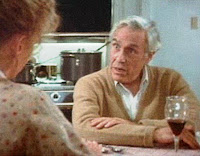1983’s Max Dugan Returns can best be described as a crossroads of sorts for Simon. It was his last film with then-wife and frequent star Marsha Mason, and the first to star Mathew Broderick (starring in this at the same time he headlined Simon’s Brighton Beach Memoirs on Broadway), who would go on to star in and represent Simon (in his youth) in several comedies throughout the 80s and 90s. It was also Simon’s most mainstream film to date, transcending the talkiness and soul-baring of previous works and emphasizing a more opened-up approach – one more in step with the current Hollywood product of the time. A modest hit, it grossed a bit less than twice its budget, but certainly nowhere near the numbers we saw with the previous decade’s The Goodbye Girl or Chapter Two. Simon’s name was no longer a guarantee of success, and it no longer would appear in front of the title.
Mason plays Nora McPhee, a widowed high school English
teacher living modestly somewhere in California with her son, Michael (Matthew
Broderick). Down on her luck of late (thanks to a her car being stolen along
with all her graded exams), she gets a spiritual uplift after meeting the
detective assigned her case, Brian Costello, whom she starts to date. But
before long a mysterious man phones her and announces his visit – he identifies
himself as Max Dugan, her long-lost dad who deserted the family years earlier
and now wants to make amends, particularly since he only has a few months left
to live.
Nora is, of course, initially apprehensive. But there’s
something else: Dugan brings with him a cache of $50,000 - money he took back, through some
potentially nefarious means, from a casino that had swindled it from him in the first place. Now he’s a wanted man – not a good situation considering daughter’s new beau – but that’s not stopping him from showering his family with lavish gifts: everything from a Mercedes to a purebred dog. Nora resists, but ultimately once she gets to know the old man she melts, her only request being that Dugan tell the truth to her son (he does, sort of). Soon dad reads the writing on the wall and bids his adieu, despite Nora’s offer to move away from all their troubles, together. Costello must let this one go, realizing the effect Max Dugan has had on his long lost family.
potentially nefarious means, from a casino that had swindled it from him in the first place. Now he’s a wanted man – not a good situation considering daughter’s new beau – but that’s not stopping him from showering his family with lavish gifts: everything from a Mercedes to a purebred dog. Nora resists, but ultimately once she gets to know the old man she melts, her only request being that Dugan tell the truth to her son (he does, sort of). Soon dad reads the writing on the wall and bids his adieu, despite Nora’s offer to move away from all their troubles, together. Costello must let this one go, realizing the effect Max Dugan has had on his long lost family.
Third time Simon mines the theme of older child attempting
to rekindle relationship with estranged parent, only his time it’s reversed:
the parent is the one to return. The result is a charming, well-performed
“fairy tale” movie with a lightweight façade representing far deeper matters,
in typical Simonesque fashion. My only main issue here is how labored the whole
thing feels. At about the midway point, after a dynamite setup and
establishment of conflict, we get scene after scene of Nora and Dugan chatting
away about why he’s there, why he shouldn’t be there, why wasn’t he there
earlier – and no, he can’t buy so many gifts/okay, he can give us some
gifts/no, he has to return all the gifts. And in between all of this, Simon
pens his usual backstory dialogue about resentment, bitterness and ultimate reconciliation.
I think part of the reason is that it’s a thin story, good
for maybe about an hour but showing its seams when flattened out to another
thirty minutes. By the time Costello is on to Dugan, we’re thankful that some
energizing conflict has taken the place of all that grating and grousing. A
warm subplot involves Dugan’s hiring of an NBA batting coach to help a
demoralized Michael get at least one hit in baseball, but it seems to come too
late. The full effect of his invigoration isn’t fully realized; only Nora and
Dugan have truly reached their respective epiphanies, but at the Pyric cost of umpteen opened closets
and boatloads of soul baring.
Yet, as I’ve said many times before, average, or even below
average (which this is not) Neil Simon is still better than 90% of those
alleged comedies out there today. And I have a soft spot in my heart for this
one; I saw it on HBO when it premiered, during a time when I saw EVERYTHING the
pay-TV channel broadcast. It was sort of a golden era for me, when my appetite
for all things film was insatiable, and it provided an outlet for me during a
rough time in my childhood. I still have the VHS tape I made of it – on Scotch,
using SLP mode to accommodate two others (which I don’t remember). Ah, the god
old days.
Stage in Simon’s life? Reflects the oft-visited theme of
parent-child estrangement, which Simon must have identified with at some point.
Simon was now enjoying a comeback on Broadway with Brighton Beach Memoirs, but had yet to
parlay that into his cinematic career. It wouldn’t happen for three more years,
when, appropriately, he adapted that play to film.
Rating: ***




No comments:
Post a Comment